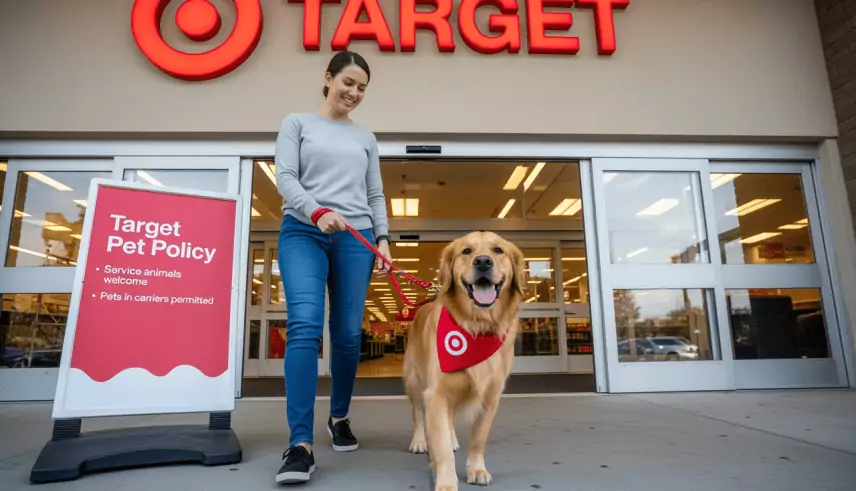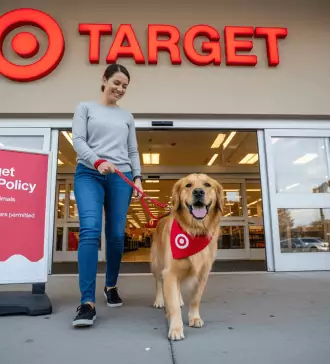

Target’s Pet Policy: Are Dogs Allowed in Target?
by Nida Hammad
Last updated: November 4, 2025
Verified and Approved by:
Angela Morris,
MSW, LCSW
Fact Checked

- Target does not allow pets in its stores because of strict health and safety regulations, especially since many locations sell or serve food. Only trained service animals, as defined by the Americans with Disabilities Act (ADA), are allowed.
- This policy is based on public health rules from authorities like the Food and Drug Administration (FDA) and local health departments, which restrict non-service animals in food-related areas to prevent contamination and maintain hygiene.
- Service animals are welcome at Target, but handlers must keep them under control, ensure proper behavior, and be ready to answer basic verification questions from employees if asked.
Target is a popular retail chain known for its wide range of products, from clothing and electronics to groceries and home goods. With thousands of stores across the United States, Target has become a household name and a go-to shopping destination for many. For pet owners, understanding Target’s pet policy is crucial, especially when considering bringing your furry friend along for a shopping spree.
Why Does Target Have a No-Dogs Policy?
You might wonder why Target, unlike Tractor Supply, doesn’t welcome dogs in their stores. The answer often comes down to food safety regulations. Most Target locations include grocery sections or have in-store Starbucks cafes, both of which serve or sell food. This triggers strict health codes set by the Department of Health and Human Services and the Food and Drug Administration (FDA). These regulations are in place to protect public health and prevent contamination, as dog hair, dander, or even a friendly nose can carry microscopic organisms that aren’t welcome around food.
So, if you’re ever unsure about bringing your dog into any store, a good rule of thumb is to ask whether food is available for purchase. If the answer is yes, chances are only service animals will be allowed inside. Unlike Tractor Supply, where you and your pup are often greeted with open arms, Target’s no-dogs policy is consistent at all locations, with no exceptions for individual stores. Always double-check with the store before making plans with your furry shopping companion.
Tips for Pet Owners
Before heading out with your furry companion, it’s always wise to call ahead and confirm the store’s pet policy, especially if you’re unsure. While some businesses are openly pet-friendly, most major retailers like Target must follow strict guidelines that limit access to service animals only. Local regulations can also play a role, and policies may differ from one chain to another.
By staying informed, you can make sure your shopping trip is smooth for both you and your four-legged friend.
Service Animals
Target complies with the Americans with Disabilities Act (ADA), which means they allow service animals into their stores. Service animals are defined as dogs that are individually trained to do work or perform tasks for an individual with a disability. This includes physical, sensory, psychiatric, intellectual, or other mental disabilities. The work or tasks performed by a service animal must be directly related to the handler’s disability.
Emotional Support Animals
While service animals are welcome in Target, emotional support animals do not enjoy the same access. Emotional support animals, often dogs, provide comfort and companionship to individuals with emotional or psychological conditions. However, unlike service animals, they are not trained to perform specific tasks related to a disability, and their access rights are primarily covered under the Fair Housing Act, not the Americans with Disabilities Act (ADA).
This means that emotional support animals are generally not permitted in Target stores. Even with documentation, Target’s policy follows ADA guidelines, which only require businesses to admit service animals that are trained to assist with a disability. If you rely on an emotional support animal, it’s best to plan your visit accordingly, as these companions are not considered service animals under federal law and are not allowed in most retail environments, including Target.
Service Dogs vs. Therapy Dogs vs. Emotional Support Animals: What’s Allowed Inside Target?
When it comes to bringing animals into public places like Target, it’s important to understand the distinctions between service dogs, therapy dogs, and emotional support animals, especially since each serves a different purpose and is governed by different rules.
Service Dogs:
Service dogs are specially trained to help individuals with disabilities by performing specific tasks, whether it’s guiding someone who is blind, alerting to a medical issue, or assisting with mobility. These dogs are recognized under the Americans with Disabilities Act (ADA), which grants them the legal right to accompany their handler into most public places, including Target stores. The key here is that service dogs are trained for a particular person and a well-defined disability-related task.
Therapy Dogs:
Unlike service dogs, therapy dogs are trained to provide comfort and emotional support to multiple people, often visiting hospitals, schools, or disaster sites. However, therapy dogs do not have public access rights under the ADA. They are only permitted in specific settings with prior approval, so they are not allowed in retail environments like Target.
Emotional Support Animals:
Emotional support animals (ESAs), typically dogs, provide comfort to their owners simply by being present. While ESAs may be allowed in certain housing situations under the Fair Housing Act, they do not have any public access rights when it comes to stores or shopping centers. This means that emotional support animals, unlike service animals, are not permitted inside Target.
Understanding these differences can help pet owners plan ahead and ensure they follow Target’s policy, as well as local laws and regulations.
Pets
Target’s official pet policy states that only service animals are allowed in their stores. This means pets, including dogs and cats, are generally not permitted inside Target locations. However, it is important to note that this policy might vary slightly by store and location, depending on local laws and regulations.
Why is Target so strict about this? The main reason is health and safety. Regulations set by the Department of Health and Human Services, particularly the Food and Drug Administration (FDA), restrict animals in retail environments, especially where food is sold, to protect public health. Pet hair, paws, and noses can carry microorganisms that may cause illnesses, making it unsafe to have non-service animals in stores like Target.
Unlike service animals, pet dogs are not trained to handle the busy, distracting environment of a retail store. Service animals typically undergo 12 to 18 months of specialized training to ensure they can work safely and effectively in public spaces. Unfortunately, untrained pets in stores have sometimes caused issues, such as urinating, grabbing food, or even acting aggressively, which can disrupt shoppers and even endanger highly trained service dogs. These incidents have led to increased scrutiny and sometimes unfair treatment of people with legitimate disabilities and their service animals.
For these reasons, Target, and most major retailers, enforce a strict no-pets policy, with exceptions only for service animals as defined by the Americans with Disabilities Act (ADA). This helps create a safe and accessible environment for all shoppers.
The Role of Health Regulations in Store Pet Policies
So, why is Target strict about not allowing pets, even the friendliest pup with the fluffiest tail, on their shopping floors? The answer boils down to health regulations, not just store preference. Public health authorities, like the Food and Drug Administration (FDA) and local health departments, establish these rules to protect the wellbeing of shoppers, especially when food is involved.
If a store sells or serves food, which Target does through its grocery sections and in-store cafés extra precautions come into play. Health codes are strict about minimizing the risk of contamination, as dogs (no matter how clean!) can carry germs, bacteria, and allergens. By limiting pets in these environments, stores stay compliant with FDA guidelines designed to prevent the spread of infectious diseases through accidental exposure to animal hair, dander, or other contaminants.
The goal is to keep food areas safe and sanitary for everyone. That’s why, even if your local Target manager seems less than welcoming to pets, they’re really just following the rules laid out by public health experts.
Why Your Dog Might Not Love Shopping at Target
While it’s tempting to imagine that your dog would relish accompanying you down the aisles of Target, most pups find shopping trips less enjoyable than we think. For dogs, the bright lights, crowds, and unfamiliar smells can feel overwhelming rather than exciting. Unlike us, they don’t appreciate Target’s seasonal displays or the thrill of browsing clearance racks.
Many dogs are most content relaxing at home or going for their usual walk, instead of navigating a bustling retail environment. So, while you might look forward to your next Target run, your furry friend might prefer a cozy nap or a play session in the backyard.
How to Navigate Target with a Service Animal
Tips for Keeping Your Service Dog Comfortable and Well-Behaved in Public
Bringing your dog, especially a service animal, into public spaces like Target comes with important responsibilities. Here are some practical ways to keep your companion comfortable, safe, and welcome during your visit:
- Respect Other Shoppers and Dogs: Always ask before letting your dog interact with other animals. Not all dogs are comfortable or social in busy environments, and a simple inquiry with another handler can prevent unwanted incidents.
- Ensure Bathroom Needs Are Met: Give your dog the chance to relieve themselves outside before entering the store. New environments can be exciting or nerve-wracking, so it’s helpful to avoid any unexpected accidents by planning ahead and cleaning up promptly if something does happen.
- Mind Their Manners Around Merchandise: Prevent your dog from sniffing, licking, or pawing at store products, especially food or anything not meant for pets. This keeps the environment sanitary and ensures your dog is a considerate guest.
- Monitor Comfort and Stress: Pay close attention to your dog’s body language. Signs like tucked tails, pinned-back ears, trembling, or attempts to hide indicate stress. If your dog seems overwhelmed, such as trying to escape crowds or acting jumpy, it’s a good idea to shorten the outing and head home.
- Stay in Control at All Times: Keep your dog on a leash and by your side, especially in crowded areas or shared spaces. Not everyone may be comfortable around dogs, and some people may have allergies or fears. Responsible supervision helps ensure everyone feels safe and respected.
By taking these steps, you’ll help ensure your service animal remains a welcome addition to public spaces, and make the experience pleasant for both your dog and fellow shoppers.
When entering a Target store with a service animal, it is important to ensure that your animal is under control and behaving appropriately. Service animals should be harnessed, leashed, or tethered, unless these devices interfere with the service animal’s work or the individual’s disability prevents using these devices. In such cases, the individual must maintain control of the animal through voice, signal, or other effective controls.
Employees at Target may ask two questions to determine if an animal qualifies as a service animal:
- Is the dog a service animal required because of a disability?
- What work or task has the dog been trained to perform?
It is crucial to answer these questions truthfully to uphold the integrity of service animal policies and ensure that individuals with disabilities continue to have their rights protected.
Where Else Can You Take Your Dog?
If you’re looking to give your dog some social exposure or just want to bring them along for errands, there are plenty of dog-friendly places to consider:
- Pet supply chains always welcome dogs, and many local shops such for pups.
- Home improvement stores are generally accommodating to dogs, especially when leashed and well-behaved.
- Breweries often allow dogs in outdoor seating areas, and some even invite your furry friend inside the taproom.
- Veterinary hospitals and clinics aren’t just for checkups or emergencies, dropping by for a quick hello can help your dog get comfortable with the sights, smells, and people.
- Outdoor shopping centers and outlet malls frequently have pet-friendly spaces or designated dog areas.
Always call ahead or check the store’s website for their most up-to-date pet policy, as rules can vary by location and situation.
Potential Consequences of Violating the Pet Policy
Violating Target’s pet policy by bringing in a non-service animal can result in being asked to leave the store. It is vital to respect the store’s policy to ensure a safe and comfortable shopping environment for all customers.
While it may seem harmless to bring a pet dog along for a quick shopping trip, untrained animals can inadvertently cause significant issues in public spaces. Unlike service animals, which undergo 12 to 18 months of specialized training to navigate distractions and environmental challenges, pet dogs are not conditioned for these settings. Incidents involving pet dogs, such as grabbing merchandise, inappropriate elimination, growling, or even aggression toward people or legitimate service dogs, have been reported in other major retailers like Costco and Walmart.
These situations can have far-reaching consequences. Not only can they result in emotional and financial hardship for individuals who rely on service animals (with the cost of a single service dog often exceeding $30,000), but they can also lead to damaging misconceptions and discrimination. When employees encounter disruptive pets, they may become wary or skeptical of all animals, which can result in service dog handlers facing uncomfortable questions or even harassment. This additional scrutiny can be distressing and traumatic for people with disabilities who depend on their service animals for everyday life.
Respecting Target’s pet policy helps protect the rights and well-being of individuals with disabilities and ensures that everyone can enjoy a safe and inclusive shopping experience.
Conclusion
Target’s commitment to upholding the Americans with Disabilities Act (ADA) ensures that individuals with disabilities can shop with ease, accompanied by their service animals. It is essential for customers to be aware of and respect Target’s pet policy, recognizing that it is in place to maintain a safe and comfortable shopping environment for everyone.
While pets are generally not allowed, service animals properly trained to assist individuals with disabilities are welcomed. Service animal handlers must maintain control of their animals and be prepared to answer questions related to their service animal’s role if asked by Target staff.
By adhering to these guidelines, we can all contribute to a positive and inclusive shopping experience at Target, demonstrating respect and consideration for fellow shoppers and store employees alike. Also, remember that when you comply with a no-pet policy, you are being a responsible pet parent supporting people with disabilities and the safety of their living, breathing medical devices.
Respecting these policies isn’t just about rules, it’s about fostering an environment where everyone, including those who rely on service animals for essential daily tasks, can feel comfortable and supported during their visit. Remember, when in doubt about the pet policy, it’s always best to contact the specific Target location you plan to visit to clarify their procedures and ensure a hassle-free shopping experience.
Frequently Asked Question
Who Regulates Animals in Stores That Sell Food?
If you’ve ever wondered who actually makes the rules about animals in stores, especially those that sell or serve food, the answer goes beyond the store manager. In reality, it’s public health authorities who are in charge here. Agencies like the Food and Drug Administration (FDA) and local health departments set strict guidelines about where animals can and cannot go, all in the interest of protecting public health. These regulations are designed to keep food preparation areas clean and safe for everyone. So, even if a store employee seems like the gatekeeper, the policy ultimately comes from much higher up the food chain (pun very much intended). That’s why you’ll notice that stores with grocery sections or in-store cafés must usually follow these animal-related regulations to the letter.
Are Therapy Dogs Allowed in Target?
While service animals are welcome at Target, therapy dogs do not receive the same access. Therapy dogs provide comfort and affection to groups of people, such as in hospitals or schools, but they are not individually trained to perform tasks for a person with a disability. As a result, therapy dogs are not covered under the ADA and are not permitted in Target stores. For example, a therapy dog that visits nursing homes to brighten residents’ days isn’t treated the same as a service animal that assists someone with a physical disability. Unless the dog qualifies as a service animal, you’ll need to leave your therapy companion at home while you shop at Target.
Are Target and Tractor Supply’s Policies Different for Allowing Dogs in Stores?
Yes, Target and Tractor Supply have different policies when it comes to . While Tractor Supply is known for being dog-friendly and usually allows dogs in stores, Target has a strict no-dogs policy. It’s important to check individual store policies before bringing dogs to Tractor Supply or any other retail location.
Certify Your Emotional Support Animal Today

- U.S. Department of Justice, Civil Rights Division. (n.d.). Service animals. ADA.gov. Retrieved November 5, 2025, from https://www.ada.gov/topics/service-animals/
Why You Can Rely on Us?
At Wellness Wag, we believe your pet deserves care rooted in both science and compassion. Each article is carefully researched, written in clear language for pet owners, and then reviewed by qualified professionals to ensure the information is evidence-based, current, and practical for real-life care. Our goal is to help you feel confident in making informed decisions about your pet’s health and well-being.
Reviewed by
Angela Morris, MSW, LCSW
Angela is a licensed clinical social worker with 20 years of experience in patient advocacy and community mental health. She has assisted numerous clients with ESA evaluations and brings a deep understanding of disability accommodations, ensuring that all information is accurate, supportive, and practical.

Written by :
Nida Hammad
Last Updated :
November 4, 2025










